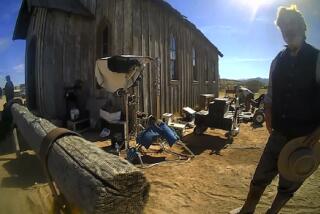Prosecutor to seek death penalty for Holmes in theater shooting
CENTENNIAL, Colo. — When the district attorney announced Monday that the suspect in the Aurora theater massacre could face the death penalty, one spectator pumped his fist in triumph. Others held their heads in their hands.
George Brauchler, elected district attorney for Colorado’s 18th Judicial District in November, said he had wrestled with the decision for months.
“It is my determination and my intention that in this case, for James Eagan Holmes, justice is death,” Brauchler said quietly.
The decision means the trial will not begin until next year to give both sides more time to prepare, and a new judge will handle the case.
Holmes, now 25, is accused of opening fire during a premiere of the latest Batman movie, “The Dark Knight Rises,” on July 20, killing 12 people and wounding at least 70. The former neuroscience student at the University of Colorado-Denver faces 166 counts of first-degree murder, attempted murder and weapons charges.
Brauchler’s decision was not unexpected — his office did not accept a standing defense offer to plead guilty if the maximum penalty was life without possibility of parole.
Marcus Weaver had hoped for a plea bargain. He was wounded in the arm in the Century 16 theater, and his friend, Rebecca Wingo, was killed. But the idea that Holmes could be put to death if convicted brought him no joy.
“I forgave him right after it happened,” said Weaver, who has lasting damage to his arm. He thought a plea bargain would shorten everyone’s suffering and help people find closure.
Weaver said he ran into Holmes’ father in a courthouse bathroom after a previous hearing and they chatted briefly. Weaver refused to detail their conversation but said he realized that Robert and Arlene Holmes were also victims and should be spared a lengthy court process.
On Monday, Holmes glanced at his parents as he entered the courtroom. He and his father seemed to lock eyes for a moment.
Later, as the courtroom emptied for a recess, Holmes’ mother rocked back and forth and wept, while his father stared straight ahead.
The chief judge who has presided over the case, William Sylvester, stepped aside Monday, citing the time required for a capital case. He assigned it to District Judge Carlos A. Samour Jr.
Holmes’ trial had been scheduled to begin Aug. 5. But as Samour took the bench, he acknowledged that a death penalty case would take more preparation and asked both sides how much time they needed. The prosecution wanted a three-month trial starting in January 2014. The defense said it could not commit to a date but predicted the trial could last nine months and said it should not begin until fall of 2014.
“They are trying to execute our client,” defense attorney Tamara Brady said, her voice rising with emotion. “We will do whatever we can to save his life.”
Samour scheduled the trial to begin Feb. 3 and last four months, with the possibility that it could be further delayed. He said a deadline would keep what promises to be a lengthy and complicated process on track. “I would like us to be aggressive,” he said.
Holmes’ attorneys had been widely expected to use an insanity defense, but at his arraignment March 12, the defense said it was not yet prepared to enter a plea. Sylvester entered a plea of not guilty on Holmes’ behalf.
The defense could change that plea, and in a court filing last week raised the possibility of an insanity defense if prosecutors rejected Holmes’ offer to plead guilty in return for life without possibility of parole. If Holmes is found legally insane or to suffer from a mental defect, he cannot be put to death.
But Samour warned defense attorneys that they would have to present a good reason to change the plea. The longer the case goes, he said, “the tougher it is going to be to convince me.”
The prosecution also could reverse course and accept a plea deal.
Samour also heard arguments Monday on whether a New York-based FoxNews.com investigative reporter must reveal who told her about the contents of a notebook that Holmes sent to his psychiatrist the day before the shooting. Jana Winter reported that the notebook contained plans of a mass shooting and stick-figure drawings of a shooter.
The defense contends that law enforcement officers violated Sylvester’s gag order by telling Winter what was in the confiscated notebook, potentially compromising Holmes’ right to a fair trial. Winter’s attorney argued that she was protected by reporters’ privilege and her sources should remain confidential. Samour continued the matter until next week, when he will hear more witnesses.
If the judge orders Winter to reveal her sources and she refuses, she could face up to six months in jail for contempt of court.
More to Read
Start your day right
Sign up for Essential California for news, features and recommendations from the L.A. Times and beyond in your inbox six days a week.
You may occasionally receive promotional content from the Los Angeles Times.





